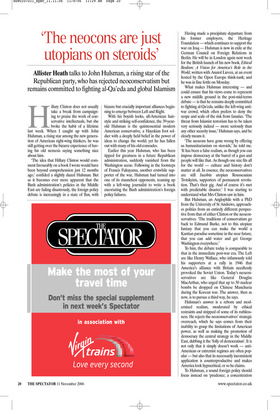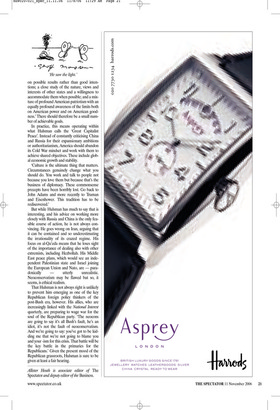‘The neocons are just utopians on steroids’
Allister Heath talks to John Hulsman, a rising star of the Republican party, who has rejected neoconservatism but remains committed to fighting al-Qa’eda and global Islamism Hillary Clinton does not usually take a break from campaigning to praise the work of conservative intellectuals, but she broke the habit of a lifetime last week. When I caught up with John Hulsman, a rising star among the new generation of American right-wing thinkers, he was still getting over the bizarre experience of having his old nemesis saying something nice about him.
‘The idea that Hillary Clinton would comment favourably on a book I wrote would have been beyond comprehension just 12 months ago,’ confided a slightly dazed Hulsman. But as it becomes ever more apparent that the Bush administration’s policies in the Middle East are failing disastrously, the foreign policy debate is increasingly in a state of flux, with bizarre but crucially important alliances beginning to emerge between Left and Right.
With his boyish looks, all-American hairstyle and striking self-confidence, the 39-yearold Hulsman is the quintessential modern American conservative, a Hayekian foot soldier with a deeply held belief in the power of ideas to change the world; yet he has fallen out with many of his old comrades.
Earlier this year Hulsman, who has been tipped for greatness in a future Republican administration, suddenly vanished from the Washington scene. Following in the footsteps of Francis Fukuyama, another erstwhile supporter of the war, Hulsman had turned into one of its staunchest opponents, teaming up with a left-wing journalist to write a book excoriating the Bush administration’s foreign policy failures. Having made a precipitate departure from his former employers, the Heritage Foundation — which continues to support the war on Iraq — Hulsman is now in exile at the German Council on Foreign Relations in Berlin. He will be in London again next week for the British launch of his new book, Ethical Realism: A Vision for America’s Role in the World, written with Anatol Lieven, at an event hosted by the Open Europe think-tank; and he was in fine fettle on Monday.
What makes Hulsman interesting — and could ensure that his views come to represent a new middle ground in the post-mid-terms debate — is that he remains deeply committed to fighting al-Qa’eda, unlike the left-wing antiwar crowd, which often prefers to deny the scope and scale of the risk from fanatics. ‘The threat from Islamist terrorism has to be taken very seriously indeed — more seriously than any other security issue,’ Hulsman says, and he clearly means it.
‘The neocons have gone wrong by offering us humanitarianism on steroids,’ he told me. ‘It has been a false realism, as though you can impose democracy at the barrel of a gun and people will like that. As though one size fits all for the world — culture and history don’t matter at all. In essence, the neoconservatives are still Jacobin utopian Rousseauian Trotskyists, supporters of permanent revolution. That’s their gig. And of course it’s met with predictable disaster.’ I was starting to understand what Mrs Clinton saw in him.
But Hulsman, an Anglophile with a PhD from the University of St Andrews, approaches politics from an entirely different perspective from that of either Clinton or the neoconservatives. ‘The traditions of conservatism go back to Edmund Burke, not to this utopian fantasy that you can make the world a Kantian paradise sometime in the near future, that you can add water and get George Washington everywhere.’ To him, the debate today is comparable to that in the immediate post-war era. The Left are like Henry Wallace, who infamously told his supporters at a rally in 1946 that America’s alliance with Britain needlessly provoked the Soviet Union. Today’s neoconservatives are like General Douglas MacArthur, who urged that up to 50 nuclear bombs be dropped on Chinese Manchuria during the Korean war. The answer, then as now, is to pursue a third way, he says.
Hulsman’s answer is a reborn and modernised realism, moderated by ethical restraints and stripped of some of its ruthlessness. He rejects the neoconservatives’ strategic overreach, which he says comes from their inability to grasp the limitations of American power, as well as making the promotion of democracy the central strategy in the Middle East, dubbing it the ‘folly of democratism’. It is not only that it simply doesn’t work — antiAmerican or extremist regimes are often popular — but also that its necessarily inconsistent application is counterproductive and makes America look hypocritical, or so he claims.
To Hulsman, a sound foreign policy should focus instead on ‘prudence; a concentration on possible results rather than good intentions; a close study of the nature, views and interests of other states and a willingness to accommodate them when possible; and a mixture of profound American patriotism with an equally profound awareness of the limits both on American power and on American goodness.’ There should therefore be a small number of achievable goals.
In practice, this means operating within what Hulsman calls the ‘Great Capitalist Peace’. Instead of constantly criticising China and Russia for their expansionary ambitions or authoritarianism, America should abandon its Cold War mindset and work with them to achieve shared objectives. These include global economic growth and stability.
‘Culture is the ultimate thing that matters. Circumstances genuinely change what you should do. You work and talk to people not because you love them but because that’s the business of diplomacy. These commonsense precepts have been horribly lost. Go back to John Adams and more recently to Truman and Eisenhower. This tradition has to be rediscovered.’ But while Hulsman has much to say that is interesting, and his advice on working more closely with Russia and China is the only feasible course of action, he is not always convincing. He goes wrong on Iran, arguing that it can be contained and so underestimating the irrationality of its crazed regime. His focus on al-Qa’eda means that he loses sight of the importance of dealing also with other extremists, including Hezbollah. His Middle East peace plans, which would see an independent Palestinian state and Israel joining the European Union and Nato, are — para doxically — utterly unrealistic. Neoconservatism may be flawed but so, it seems, is ethical realism.
That Hulsman is not always right is unlikely to prevent him emerging as one of the key Republican foreign policy thinkers of the post-Bush era, however. His allies, who are increasingly linked with the National Interest quarterly, are preparing to wage war for the soul of the Republican party. ‘The neocons are going to say it’s all Bush’s fault, he’s an idiot, it’s not the fault of neoconservatism. And we’re going to say: you’ve got to be kidding me that we’re not going to blame you and your -ism for this crisis. That battle will be the key battle in the primaries for the Republicans.’ Given the present mood of the Republican grassroots, Hulsman is sure to be given at least a fair hearing.



































































































 Previous page
Previous page